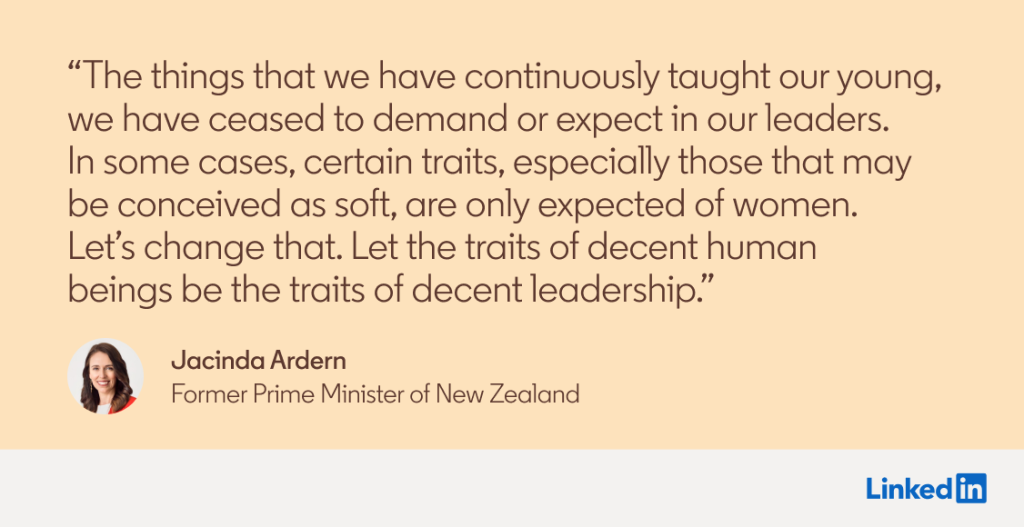In 2017, at age 37, Jacinda Ardern was elected New Zealand’s prime minister, making her the world’s youngest female head of government. A year later, she became the second elected government leader to give birth while holding office, inspiring working women around the world. During her 5½-year term, Jacinda deftly navigated one crisis after another, including a volcanic eruption, the COVID-19 pandemic, and terrorist attacks on two mosques that killed 51 people.
Along the way, she emerged as a compassionate and empathetic leader. In recognition of these accomplishments, Jacinda landed on the cover of British Vogue, was twice included in Time’s list of the 100 most influential people, and occupied the No. 1 spot in Fortune’s 2021 list of the world’s greatest leaders.
Jacinda, who stepped down as prime minister of New Zealand in January, recently took the stage at Talent Connect to talk about the hallmarks of a great leader and her own leadership journey. The following are some of the valuable lessons from her speech:
1. Organizations should seek out “reluctant leaders”
While Jacinda is known as one of the world’s most notable government leaders, she often doubted her own abilities. In fact, she said, others saw her potential and encouraged her to run. When asked by a former boss whether she would consider running for office, she was convinced it would be the wrong move.
This feeling of not being worthy of a leadership position is especially prevalent among women, Jacinda added, noting that women make up 58.4% of the U.S. workforce, but only 35% of senior leadership positions. The message: Organizations that seek out reluctant leaders can uncover hidden talent and boost diversity at the top.
“Some leaders are hesitant and, in many cases, they’re plain old reluctant,” Jacinda said. “Knowing that and understanding why will help us identify talent and skills we may otherwise miss.”

2. Leaders, remember your role is temporary
How can leaders motivate themselves to do great work? One way is to keep reminding themselves that their time in power is limited.
“Nothing focuses the mind more than seeing that our time in leadership is temporary,” she added. “Not only will that get you through the hard times, it focuses your intention on making every day count.”
3. In times of crisis, express compassion and take action
In one of the highlights of her speech, Jacinda talked about her response to the 2019 terrorist attacks that targeted Muslim worshippers at two mosques.
At the time, Jacinda earned praise for the way she demonstrated empathy and support for the Muslim community. In a sign of solidarity and respect, she wore a black hijab when meeting with survivors of the attack and their families. She chose not to name the attacker, so as not to give him the spotlight he sought.
“In moments of tragedy and crisis,” Jacinda said, “if we want to reflect the experience and emotions that our own communities are experiencing, then we must ask ourselves one simple question, ‘How do I feel?’ Are you grieving, sad, angry, or all of those things? If the answer is yes, it’s likely your people will feel the same. Don’t be afraid to express those very same emotions.”
4. Leaders should be clear about what they know — and what they don’t know
How do you maintain the public’s trust during times of crisis?
During the early days of the pandemic, Jacinda closed New Zealand’s borders to foreigners and imposed a nationwide shutdown, actions that vastly reduced the spread of the virus. A recent study estimated that her government’s action ended up saving 20,000 lives.
What she didn’t do is pretend to have all the answers. The reason: Being transparent about what you do and don’t know is critical to building credibility.
5. The most important trait of a great leader: human decency
At the conclusion of her speech, Jacinda offered a simple message. “The most important leadership principles can be found in what we teach our children — empathy, curiosity, bravery, and kindness,” she said.
These basic human principles are no longer expected of our leaders. It’s time to shift gears.
“The things that we have continuously taught our young, we have ceased to demand or expect in our leaders,” Jacinda said. “In some cases, certain traits, especially those that may be conceived as soft, are only expected of women. Let’s change that. Let the traits of decent human beings be the traits of decent leadership.”
...
SOurce > LinkedIn




